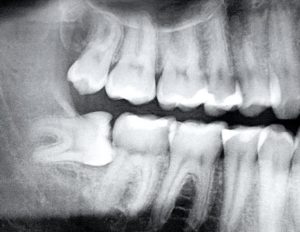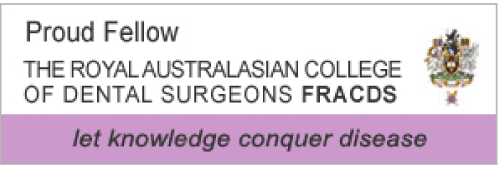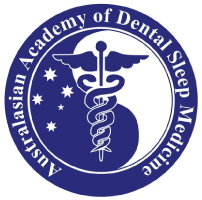Do you feel pressure or pain in your gums or jawbone?
Are your back teeth aching?
Your wisdom teeth may be impacted and need to be removed.
What are wisdom teeth and why do they cause pain?

Your wisdom teeth (the 3rd molar) are the last adult teeth to appear – usually in your late teens or early twenties.
When you have enough space for them, the wisdom teeth come through the gums without any problems. If there’s not enough space, your wisdom teeth get stuck in the jawbone. This stops them from growing straight in your mouth.
Does everyone get wisdom teeth?
Almost everyone gets wisdom teeth, but the amount of wisdom teeth varies. Some people may have all 4 wisdom teeth (most common) some may have only 1 or 2 or 3 wisdom teeth.
The current theory behind the development of wisdom teeth
Years ago, due to decay humans lost many teeth by the time they were adults. Because of the lost teeth and molars, wisdom teeth erupted to fill the space.
Today, due to good dental health and nutrition people generally don’t lose teeth. Because we no longer need wisdom teeth, we’re now seeing less wisdom teeth erupting and forming.
Why do wisdom teeth become impacted?
Even if you have good oral hygiene, you may get wisdom teeth problems because you’ve got:
- Gum infections that cause pain and swelling, and
- Tooth decay because you can’t reach the teeth to clean them.
Because food can get trapped between them, impacted wisdom teeth can cause decay in your adjacent teeth. Occasionally, cysts or tumours can form around the roots of your wisdom teeth. These will weaken your jawbone.
I’m having wisdom tooth pain. What can I do about it?
At Mosman Village Dentistry, we assess your wisdom teeth from a panoramic OPG X-ray taken in our office. In straightforward cases, your wisdom teeth can be easily removed in our surgery under local anaesthetic. In complex cases, we may refer you to a specialist Oral & Maxillofacial Surgeon.
If you have an acute infection and/or swelling around your wisdom tooth, a course of antibiotics may be required to settle down the infection before we remove it. It’s important to note that once the infection subsides, your offending wisdom tooth should be removed as planned. If it’s not removed, your pain and swelling will most definitely return – often at an inconvenient time.
Using repeated courses of antibiotics to manage wisdom tooth pain is not recommended.
What’s happens when a wisdom tooth removed?
The first step we take is to diagnose then plan your treatment. We also assess if the roots of your wisdom teeth are close to any anatomical features such as nerves or sinuses. Any risks or complications involved with the wisdom tooth surgery are discussed in detail with you.
Simple wisdom tooth extractions:
If your wisdom tooth is fully visible in your mouth, it will be a straightforward procedure to extract. This fully erupted wisdom tooth can be easily grasped and eased out of the jawbone relatively quickly.
Wisdom tooth extraction by surgery:
If your wisdom tooth is impacted or partially embedded under the bone, it’s a more complicated extraction. To get access to the tooth and remove it without disturbing any neighbouring teeth, a surgical gum incision is made. The wisdom tooth is then sectioned into several parts that are removed piece by piece.
General Anaesthetics V Local Anaesthetics:
If you want to have your wisdom tooth extractions performed while asleep under a general anaesthetic, we’ll refer you to a specialist Oral Maxillofacial Surgeon.
If your wisdom tooth extraction is relatively simple and straight forward, you may wish to have the extraction in our rooms under local anaesthetics. This is the more economical treatment option.
How long does the pain last after wisdom tooth extraction?
After the extraction, you’ll remain numb in that area for a few hours. Surprisingly, many people report minimal pain after the extraction. Often, the symptoms associated with wisdom tooth before the extraction is worse.
If you have any pain it will subside within a few days. Any bruising or swelling that occurs may take 7 to 14 days to completely disappear.
What to expect after wisdom tooth extraction
Medication:
You’ll be prescribed strong pain analgesics to control any post-operative symptoms. Depending on the complexity of the surgery carried out, you may be prescribed antibiotics. It’s important to take medications as per instructions. Even if you feel well before the completion of the antibiotics, you must finish the entire course prescribed.
Wound care:
You may have stitches in place where the tooth was removed. It’s important to leave the stitches undisturbed. Most stitches are dissolvable, meaning they will breakdown and fall out within 7 to 14 days.
For optimal healing and to prevent infection, it’s important to keep your mouth and the wound clean. While normal oral hygiene is recommended, it’s important to be gentle and take care not to disturb the wound. Your mouth heals very fast and after 2-3 days, most patients find it very comfortable to chew on the same side as the wisdom tooth extraction site.
Bleeding:
After your wisdom tooth extraction, you may have some bleeding in the first 24 hours. We give you sterile gauze and show you how to fold and place it over the wound while biting down firmly for 15 minutes.
Compression is the best home remedy for bleeding wound. If you’re concerned about the bleeding, you’ll be able to contact our dentists on an emergency phone number.
What to eat after your wisdom tooth extraction:
It’s important to keep hydrated and well nourished during the healing and recovery stage. Soup or a smoothie is an ideal first meal. It’s also important to avoid hot food or drinks while you’re still numb as you may inadvertently cause burns to the soft tissues in your mouth.
What is dry socket and why can it happen after wisdom teeth removal?
After any tooth extraction, including wisdom teeth removal, there’s a small risk of getting dry socket. The medical term for dry socket is alveolar osteitis – meaning inflammation of bone due to a lost blood clot. Dry socket occurs when the blood clot that should form after the wisdom tooth has been removed dissolves or is dislodged. This is why we advise patients not to spit or rinse vigorously after their wisdom tooth extraction.
The main symptom of dry socket is pain, which can be accompanied by bad breath. Any pain can be eased with a dressing and prescribed analgesics.
If you smoke or have had a traumatic extraction, you’ll have a higher risk of developing dry socket. Because dry socket isn’t an infection or of bacterial origin, there is no need for antibiotics.





